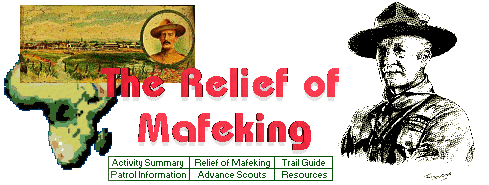Become A Sponsor
|
Why Ads

Incident on a London Street, 1908
(lights dim, curtains open, spotlight with blue gel [to simulate
night] comes on to center stage, fog fills stage)
NARRATOR: It was a foggy night in London, England, eighty-eight
years ago, and an American businessman and publisher from Chicago,
William D. Boyce, was lost.
(enter a scout in costume -- overcoat, bowler or
derby, carrying briefcase).
NARRATOR: It had been a long day, and now here he was -- after
dark, in a strange city, looking for a street address during one of
London's famous heavy fogs.
(Scout pantomimes the narrative)
NARRATOR: Mr. Boyce stopped and took out a street map and,
after looking at it for a minute, scratched his head and tried
to get his bearings. It looked impossible, although he knew he couldn't
be very far from his destination. Mr. Boyce was almost ready to
give up and hail a hansom cab for a ride...
(enter another scout in uniform)
NARRATOR: ...when a boy, wearing some kind of strange uniform, appeared mysteriously out of the fog and said, "May
I help you, sir?" Mr. Boyce nodded gratefully and showed him the address he was trying to find. "A piece of cake, sir," the boy said.
"It's not far. I'll be happy to show you the way."
(Scout leads "Mr. Boyce" off, and they walk slowly
around the stage, pretending to talk)
NARRATOR: The boy led Mr. Boyce off. As they walked along,
Mr. Boyce asked the boy about the uniform he was wearing, and the boy
told Mr. Boyce about a new organization for boys, called Boy Scouting.
It had been started the year before by a British army general named
BadenPowell. Scouting had 5,000 boys in it the first
year, but now, less than 24 months later, 100,000 boys had joined.
Boy scouts stood for something, the boy saidfaith
in God, love of family, friends, King and country, belief in selfreliance
and personal discipline, and the value of always doing your best.
Boy scouts also believed in doing a "good turn" daily.
After a short walk, they arrived at Mr. Boyce's destination.
Boyce reached into his pocket to give the boy a coin for a tip,
but the scout held up his hand and declined. "No sir,"
he replied, "this was my good turn today. Good night." And the boy disappeared
into the fog, as mysteriously as he had appeared.
(Scout exits the stage. After a brief pause, "Mr. Boyce"
exits, too. Lights come up here)
NARRATOR: Boyce was deeply impressed by this incident, and
the next day made an appointment with General BadenPowell.
He returned to America a few days later with a trunk full of uniforms and
manuals, and a head full of ideas for starting scouting in America.
And so, a little over a year later, on February 8, 1910,
a notice appeared in a Chicago paper, announcing the incorporation
of the Boy Scouts of America. Thousands of scouts joined that first
yearand the rest, as they say, is history.
Today we in this room are part of a world wide movement,
with almost 5 million boys and thousands of adult leaders in this country
alone. More than 90 million American men have been scouts since
1910.
As for the mysterious English boy scoutno one
ever learned who he was, and his identity to this day remains a mystery. But
he lives on in the memories of millions of American scouts, past and
present. And in London today, outside Gilwell, the birthplace of the world
scouting movement, is a statue of a buffalo, put there by American
scouts, to honor and memorialize that unknown English boy scout.
Such is the power of a single, simple good turn.
So boys, as we sit down tonight for dinner with our friends
and families and fellow scouts, it's altogether right that we
remember this incident, and also remember always that we are part
of something great, and important, and meaningful.
Would our color guard please present the colors.
END OF SKIT
Feel free to use as you wishwith credit to Pack
1515, Alexandria, VA, please.
This web page was written by Bob Myers,
Committee Member, Troop 3, Cincinnati, Ohio
with web authoring assistance by Michael F. Bowman, USSSP Web Team
|





